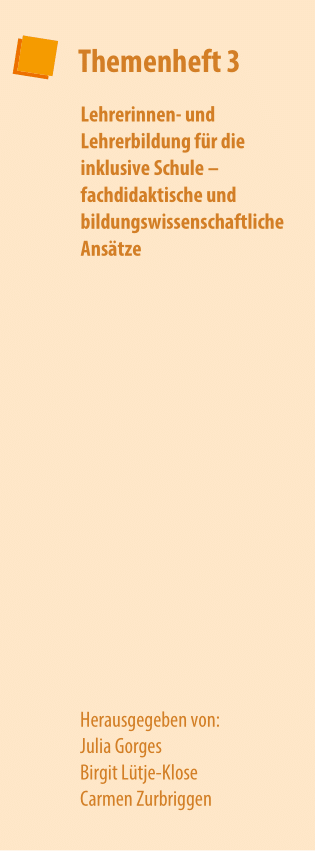Multi-Professional Cooperation in Inclusive All-day Schools in University Teaching
Development of Inclusion-related and Cooperative Attitudes of Prospective Teachers and Social Work Professionals in an Interdisciplinary Masters Seminar
DOI:
https://doi.org/10.4119/hlz-2472Keywords:
Inclusion, Cooperation, Attitudes, Professionalization, Higher Education ResearchAbstract
This empirical contribution focuses on the quantitative findings of a subproject on multi-professional cooperation in inclusive all-day schools, which is part of the “Qualitätsoffensive Lehrerbildung” at the University of Bielefeld. With this teaching research project, the desideratum to establish multi-professional cooperation as a subject of university teaching is to be taken into account. In a pre-post control group design (N=90), the attitudes of the students towards inclusion (Forlin, Earle, Loreman & Sharma, 2011) and multi-professional cooperation (Di-zinger, Fussangel & Böhm-Kasper, 2011) before and after the seminar were surveyed and contrasted with the results of a comparison group (N=63), which did not attend the newly conceived teaching research seminar. It turns out that the established measuring instruments of inclusion and cooperation research are not able to uncover changes in attitudes by exclusively quantitative means. Rather, they require (re-)adjustment and/or supplementation by explorative-qualitative research, in order to be able to represent the dialectical irritations and critical-reflective processes that are set in motion and are also aspired to with the seminar.
Downloads
Additional Files
-
Abstract3222
-
Beitrag 4118
-
Online-Supplement - Skalendokumentation 223
Published
How to Cite
Issue
Section
License
Copyright (c) 2019 Benedikt Hopmann, Oliver Böhm-Kasper, Birgit Lütje-Klose

This work is licensed under a Creative Commons Attribution-ShareAlike 4.0 International License.
Sämtliche Inhalte der HLZ werden freigegeben unter der Creative-Commons-Lizenz Namensnennung, Weitergabe unter gleichen Bedingungen, Version 4.0 International (CC BY-SA 4.0). Die Urheber_innen und die Rechteinhaber_innen der in der HLZ veröffentlichten Beiträge gewähren grundsätzlich allen Nutzer_innen unwiderruflich das freie, weltweite Zugangsrecht zu diesen Veröffentlichungen. Unter der Bedingung, dass Autor_innen und Herausgeber_innen gemäß der Zitationshinweise sowie die Lizenz als »Lizenz: CC BY-SA 4.0« einschließlich der untenstehenden Lizenz-URL genannt werden, dürfen die Beiträge der HLZ vervielfältigt, weitergereicht und auf beliebige Weise genutzt werden, auch kommerziell und ebenso online wie in gedruckter oder anderer Form. Auch die Bearbeitung ist erlaubt unter der zusätzlichen Bedingung, dass das neu entstandene Werk als Bearbeitung gekennzeichnet wird und im Falle einer Veröffentlichung unter derselben Lizenz wie in der HLZ freigegeben wird.





